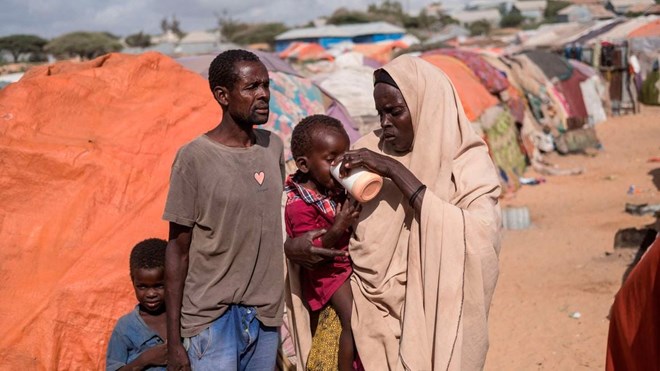
Sunday October 23, 2022

As the international community converges on Egypt for COP27 in a fortnight, the news coming out of Somalia is gut-wrenching. PHOTO | MACIEJ MOSKWA | NURPHOTO | AFP
As the international community converges on Egypt for COP27 in a fortnight, the news coming out of Somalia is gut-wrenching. Multiple sources report an acute climate-induced crisis that has resulted in unprecedented number of people suffering and dying from hunger.
Speaking to journalists earlier this week in Geneva, James Elder, Unicef Spokesperson, said that since August, 44,000 children in Somalia had been admitted to a healthy facility suffering severe malnutrition. That translates to an admission rate of one a child every minute. And that is not counting those who have not made it to a health facility.
After four failed rainy seasons and a shaky forecast, Unicef estimates that 6.7 million people are in urgent need of food aid in Somalia. Yet Somalia may be just the tip of a crisis affecting a much larger number of people.
Ukraine war
In a September 12 Oped, David Miliband, chief executive and president of the International Rescue Committee, reveals that in Eastern Africa, four failed rain seasons, conflict, Covid-19 and the aftershocks of the war in Ukraine, had resulted in food insecurity for 20 million people.
He adds that, responsible for just 1.2 percent of global greenhouse gas emissions, Eastern Africa carries the staggering burden of 70 percent of the world’s food insecure people and 17 percent of global humanitarian need.
It is obvious that while the messages coming out of COP27 about the effects of climate change will resonate with such people, the proposed responses, far removed from their existential crisis, may not. As Miliband argues, the fate of climate and the world’s most vulnerable people, who happen to have contributed least to the climate crisis but are bearing the brunt of it, are interwoven.
Talk people first
As they say, charity begins at home. COP27 needs to talk people first. It will not succeed in moderating the climate crisis unless global leaders commit to sustainable ways of meeting the needs of and pulling away from the edge of survival, the world’s most vulnerable populations. As of this past Monday, Unicef had secured only 45 percent of the $2.2 billion it needs to address the malnutrition crisis in Somalia. Elder put it rather plainly: “Without greater action and investment, we are facing the death of children on a scale not seen in half a century.”
How many deaths will it take before the Somalia appeal achieves 100 percent funding? Mirroring the poverty cycle, climate and conflict feed off each other, creating a cycle of conflict, as we see in communities that are living on the margins of drought and natural disaster. The scramble for resources as basic as water can result in intractable, if avoidable, conflict.
The Global North has developed and achieved the present levels of comfort for itself, at the price of climate and natural resource vandalism, leaving behind devastated and vulnerable communities. They cannot run away from this guilt and the associated need for reparations.
Somalia and Ethiopia make a compelling case.